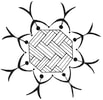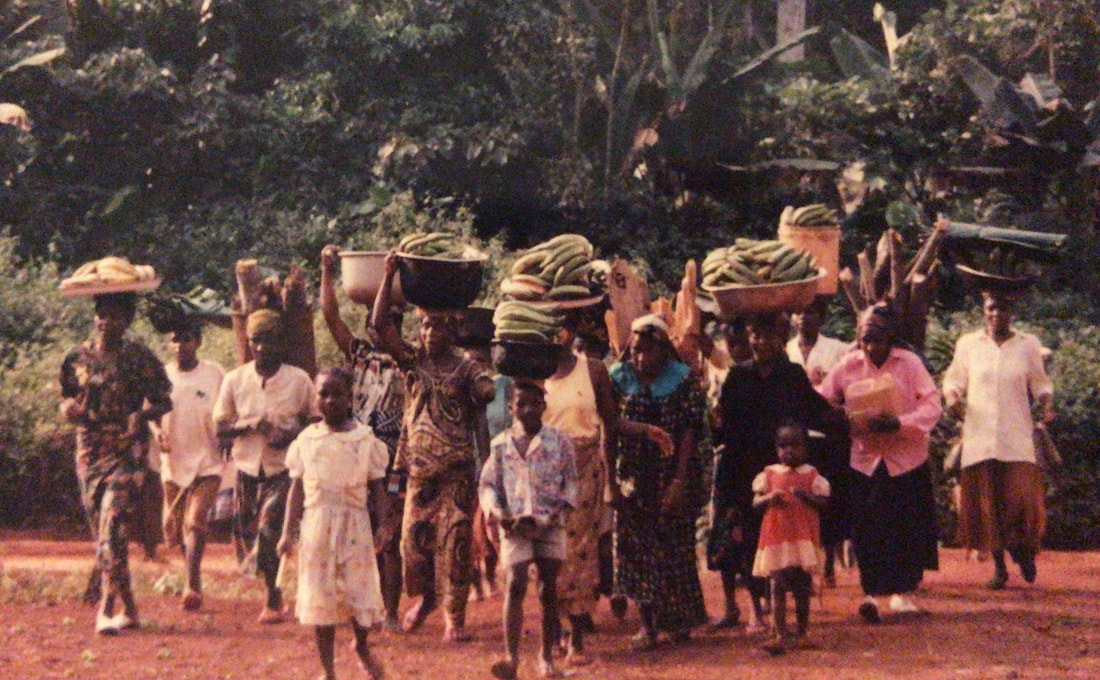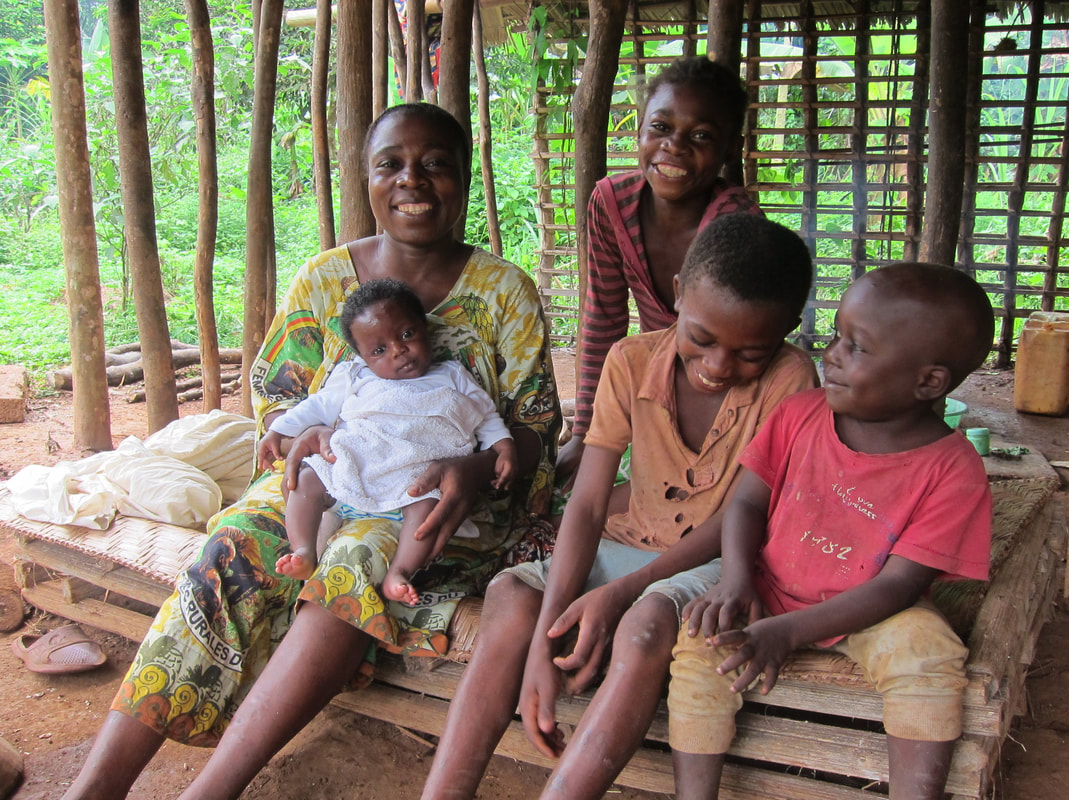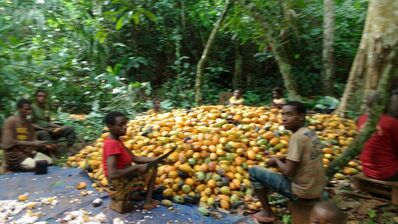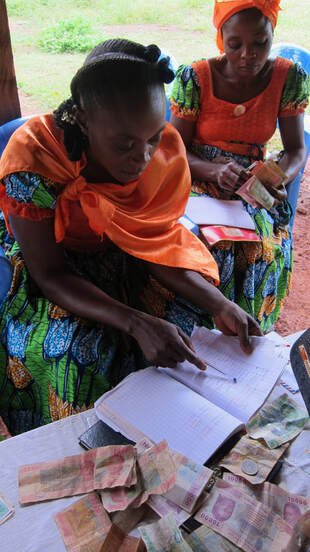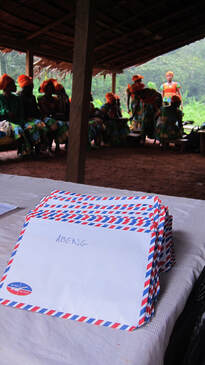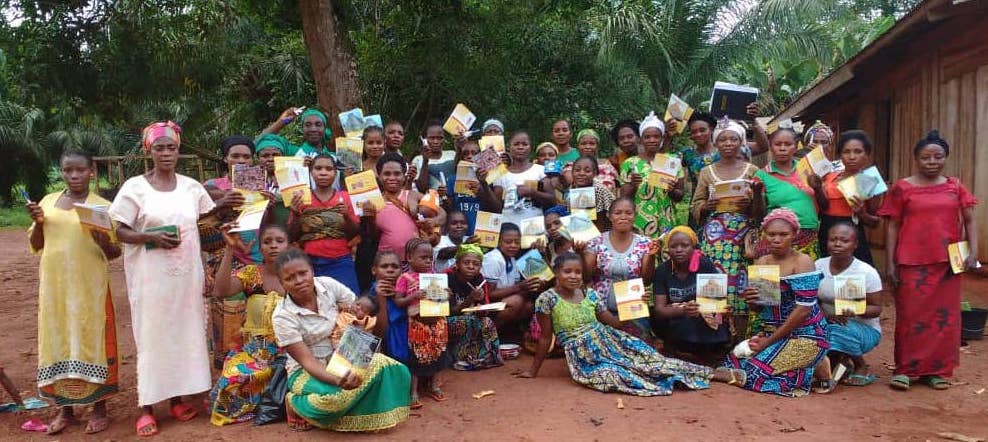Essoungue:
A Traditional Women's Association for Mutual Aid
A Traditional Women's Association for Mutual Aid
Essoungue is a traditional association that brings together the women of four ethnic groups in southeastern Cameroon. In existence for as long as the most elderly women in the region can recall, Essoungue traditionally provides a safety net—through collective effort—to support women in the community whose lives take an unexpectedly difficult turn, such as the death of a spouse and subsequent funerary obligations, the birth of twins, or sustained illness. When a woman is in need, the mokondji Essoungue, or chief/president of Essoungue, puts out a call to members of the association to gather resources to present to the needful woman and her family. Walking through the long village in their holiday best, women sing as they pass through each hamlet, the parade of music and generosity swelling as Essoungue women join the procession, bearing their gifts. The women arrive at the household that needs support, and present their gifts of food and firewood, water and soap, to the women who support the family. Essoungue members dance and sing, providing both material and emotional support.
Essoungue: Providing a Traditional Savings Mechanism
|
A second function of Essoungue is to provide a savings mechanism for women. In a cash strapped context such as the Lobéké forest region of southeastern Cameroon, women cannot count on having disposable income to purchase either daily necessities, such as salt, soap, or kerosene for lamps, to meet periodic needs, such as school fees, or to pay for emergency services, such as transportation and medical treatment at either the state-run or missionary hospital in the region. Although women undertake the bulk of agricultural, gathering, fishing, and domestic labor--and also may participate in hunting and in wage labor--men tend to control family finances. Where income is earned collectively, for example from a cocoa garden that a couple and their children tend and harvest together, the man controls the money. Income from cocoa is particularly difficult to manage, as the cocoa beans are harvested and sold only once annually, in December/January. Families need to marshal these resources extremely carefully for them to last through the year. School fees are due in September, and many women discover that, by the time they need to purchase uniforms and school supplies for their children's education, the family has no remaining money.
|
Mother with her children, at their forest garden.
(Lopondji, 2017) Cocoa harvest (Dioula, 2019)
|
|
Essoungue members have the option of making small, regular donations into Essoungue's kitty, using the Association's account at a credit agency in Moloundou, a town 30 kilometers away, to save their money. When women bring their money to Essoungue for safekeeping, the treasurer makes a careful record of each deposit. During the small dry season, in July and August, when families are working to gather funds for their children's return to school in late August, Essoungue holds a large, celebratory meeting when the funds that each woman saved over the previous year are returned to her. Women receive their savings in an envelope, each one singing and celebrating her delight at having savings that she can count on. Often women take the portion of the money that they need for school fees or other immediate needs, and return a substantial portion of the money back to Essoungue for safekeeping.
|
|
Envelopes of women's savings, ready for return to each member. (Dioula, 2019)
|
Members of Essoungue, celebrating their savings. (Dioula, 2019)
|
Essoungue provides an ideal organizational structure for supporting small-scale, village-based projects to support the social, economic, and health development of families in this region. The rationale of Essoungue is that women come together to work for the benefit of women and children throughout the village; this positive approach to collective work encourages women throughout the village and from all four ethnic groups to participate. For example, in preparation for the new school year in 2017, before Essoungue was formalized legally, the women set aside a portion of their plantain harvest to sell along the road to passing logging trucks. With this modest infusion of additional income, women purchased notebooks, pens, and calendars for all of the children—including children of families whose women have not (yet) become members of Essoungue—providing them with the basic supplies to enable their participation in school.
Essoungue members, with notebooks, calendars, and pens that they had purchased to distribute to school children in (Dioula, 2017)
Esonge-USA
In parallel with the establishment of Essoungue in Dioula, we have established Esonge in the United States as a non-profit organization. The goal of Esonge in the United States is to provide a bridge between funders in the United States and the village-based development efforts of women in southeastern Cameroon.
The women of Dioula Village have been especially active in organizing, running, and managing their Essoungue association because of the dynamic leadership of Mayone Pascaline and the determination and collaboration of all of the members. It is because of their initiative that we have chosen to found Esonge to support the women’s work, beginning in Dioula. We aim to support women in other villages in southeastern Cameroon as they legalize their Essoungue associations, with the goal of expanding Esonge-USA's partnership with women throughout the region of southeastern Cameroon where Bangando, Baka, Bakwélé, and Mbomam communities reside.
We work to raise consistent, modest sources of funding that can support small-scale, ongoing village-based projects. We have long-established relationships with the villagers of southeastern Cameroon, and as a result, we have a high degree of confidence in their commitment to Essoungue and to the partnership with Esonge-USA. Modest but consistent financial support from Esonge-USA makes a substantial impact on the lives of the women and their families; this funding supports projects that the women themselves have proposed and organized to address specific needs in their communities.
In parallel with the establishment of Essoungue in Dioula, we have established Esonge in the United States as a non-profit organization. The goal of Esonge in the United States is to provide a bridge between funders in the United States and the village-based development efforts of women in southeastern Cameroon.
The women of Dioula Village have been especially active in organizing, running, and managing their Essoungue association because of the dynamic leadership of Mayone Pascaline and the determination and collaboration of all of the members. It is because of their initiative that we have chosen to found Esonge to support the women’s work, beginning in Dioula. We aim to support women in other villages in southeastern Cameroon as they legalize their Essoungue associations, with the goal of expanding Esonge-USA's partnership with women throughout the region of southeastern Cameroon where Bangando, Baka, Bakwélé, and Mbomam communities reside.
We work to raise consistent, modest sources of funding that can support small-scale, ongoing village-based projects. We have long-established relationships with the villagers of southeastern Cameroon, and as a result, we have a high degree of confidence in their commitment to Essoungue and to the partnership with Esonge-USA. Modest but consistent financial support from Esonge-USA makes a substantial impact on the lives of the women and their families; this funding supports projects that the women themselves have proposed and organized to address specific needs in their communities.
